 Advanced Micro Devices (AMD) is reportedly introducing triple-core Phenom processors to its much decorated chips portfolio. The three-core chips will essentially be quad-core Phenom processors -- with one core disabled, according to AMD.
Advanced Micro Devices (AMD) is reportedly introducing triple-core Phenom processors to its much decorated chips portfolio. The three-core chips will essentially be quad-core Phenom processors -- with one core disabled, according to AMD.
In a way, the company is looking to make concrete use of four-cores that don't quite make the cut instead of relegating them to scrap. While a balanced approach towards multiple cores is common practice, AMD has it that even an odd number of chips can make light work out of a single workload. Part of AMD's roadmap update, the company indicated that it's 'Toliman' triple-core chip would be out in 2008; the 'Heka' triple-core chip in 2009; and a Gen-Next 'Regor' dual-core chip -- also in 2009. Meanwhile, the timing of AMD's announcement is precariously close to the ongoing Intel Developer Forum, yet consumers are likely to see the move more as addition of yet another mid-range chip to somewhat blur the dividing lines between a high end Phenom and a low end single-core Athlon.
Tuesday, September 18, 2007
AMD Announces Three Core Chips !
Posted by
vteck
at
11:14 PM
0
comments
![]()
Tuesday, September 11, 2007
AMD Intros Quad-Core Processor !
 AMD has introduced its first Quad-Core Opteron processor, which promises a 50% increase in performance, energy efficiency, virtualization, and investment protection. Quad-Core AMD Opteron processors are claimed to be the world s most energy-efficient x86 architecture, which include power-saving technologies such as:
AMD has introduced its first Quad-Core Opteron processor, which promises a 50% increase in performance, energy efficiency, virtualization, and investment protection. Quad-Core AMD Opteron processors are claimed to be the world s most energy-efficient x86 architecture, which include power-saving technologies such as:
- CoolCore Technology, which reduces energy consumption by turning off unused parts of the processor; - Independent Dynamic Core Technology, an enhancement to AMD PowerNow! Technology, which allows each core to vary its clock frequency depending on the system load and performance requirement; and - Dual Dynamic Power Management (DDPM), which independently supplies power to the cores and the memory controller, allowing them to operate on different voltages, determined by usage. DDPM is available in most Quad-Core AMD Opteron processor-based platforms being introduced. The new Opteron processors feature Direct Connect Architecture that, in presence of the integrated memory controller, enables reduced memory latency, and Rapid Virtualization Indexing. Rapid Virtualization Indexing takes functionality that was previously performed in software. It greatly accelerates it by performing those functions within the CPU to help enable near-real time application performance. The processors also maintain compatibility with the socket and thermal envelopes of second-generation AMD Opteron processors to enable a seamless upgrade. Meanwhile, AMD claims that Opetron processors outperform the competition on several industry-standard benchmarks (within comparable thermal bands) like SPECfp_rate2006, SPECint_2006, SPECompM2001Base, STREAM, Fluent, and LS-DYNA. Along with the new processors, AMD has also introduced a new metric - Average CPU Power (ACP), which represents processor power usage, including cores, integrated memory controller, and HyperTransport technology links, while running a suite of typical, high-utilization workloads to be more indicative of the power consumption that end-users can expect. These processors are 55- and 75-watt on the ACP metric. The company also promises to state the processors Thermal Design Power (TDP) specifications as well. The systems based on Quad-Core AMD Opteron processors from global Original Equipment Manufacturers (OEMs) and system-builder partners have already started shipping. Besides, some manufacturers, including Appro, Egenera, Gateway, Rackable Systems, Supermicro, and Verari have announced their Quad-Core range at the launch. In addition, AMD Phenom processor solutions, which would leverage many of the same benefits of this innovative, next-generation architecture, should be available for the desktop market in December this year.
Posted by
vteck
at
10:20 AM
0
comments
![]()





